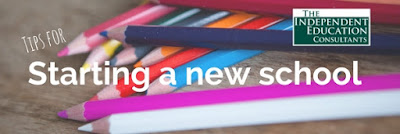Your child’s school report is much more than a termly record
of your child’s classroom input and development, to be filed away in a
cupboard. It’s an invaluable tool in helping you and your child to review and set
academic and extra-curricular goals.
As part of our study skills work with children, we regularly
go through school reports with students, helping them identify areas where they
should be congratulated and other areas where they can improve. If it helps,
these can be put in to a simple two column chart, so they can quickly identify
their strengths and areas for improvement.
Remember, praise comes first for things they’ve done well,
goals they’ve met and achievements to be proud of. Then it’s time to look
closely at the areas that need improvement and take time to discuss these –
your child will probably know which ones need seriously addressing and they may
surprise you with their insight. Ask
them to volunteer thoughts as they are far more likely to buy into points
they’ve raised themselves. Between you, pick out and agree upon 4 or 5 areas to
target as goals for the next report.
Needless to say, there is a level of sensitivity involved in
this exercise, so be conscious of the language and phrases you use – try saying
things like:
“Your English and
History look great! But some of the other subjects are disappointing – what’s
different about those classes?”
“It’s good to hear you’re speaking out in class, and to see
that you’re doing well with homework. Let’s work on revision over the rest of
term.”
Your target list then becomes ‘Objectives For Next Term.’ Print these out and display them
somewhere your child will see, such as close to their desk or on the
fridge.
As the term continues try not to nag, but do give them a
gentle nudge/reminder when appropriate. Ask them how they feel it’s going, but
pick your timing – often a casual chat over supper is more effective than a
sit-down review!
Use parents’ evening as an opportunity to discuss if there
has been an improvement with their teachers.
This is a good time to review the objectives list with your child – are
there any that you both feel have been achieved? Are there any still going unaddressed? Remember praise is effective, but don’t overdo
it or give it where undeserved.
At the end of term, review their new report alongside the
old one – actively seek out signs of improvement in areas that appear on your
goals list. Reward and congratulate.
However, don’t let your child be disheartened if they feel they have
achieved a goal but it’s not reflected in their report – assure them you know
they were working hard and if appropriate speak to their teacher for further
feedback.
When setting your objectives be realistic about improvement.
Here are some sample
goals – your child will have his or her own areas to improve on, but these
might help with inspiration:
Music Grades: See if
you can pass that grade 3 for Singing.
Speak to your music teacher about trying for grades in Piano.
Reading: You will try to read at least 2 of The Dark
Material books by the end of half term. If you run out of books on your kindle,
come and ask me to download more for you. At least 30 minutes of reading a day
is the minimum!
Unit test revision and highlighting key-facts for
subjects like History. Use a highlighter pen to emphasise key-facts and words
to remember. We agreed you would spend some extra time revising for unit tests
to ensure you get the best results possible.
Grades: We are aiming for 5 B’s and 3A’s and almost all 5’s
for effort. You will focus particularly on Sciences, Spanish and RS.
Activities- choir, football, plus you will choose two more
clubs, when you know what is available.
This weeks blog was written by Claire Coker and Catherine Stoker, who regularly work with children, helping them develop their study skills. If your child needs some encouragement with their school work, contact our team to see how we can help.



